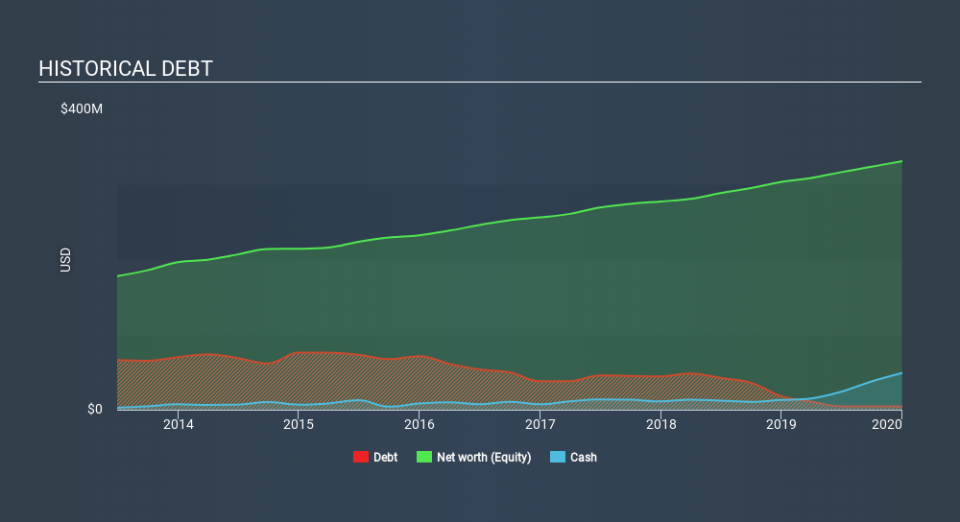We Think Badger Meter (NYSE:BMI) Can Manage Its Debt With Ease

Legendary fund manager Li Lu (who Charlie Munger backed) once said, 'The biggest investment risk is not the volatility of prices, but whether you will suffer a permanent loss of capital. So it seems the smart money knows that debt - which is usually involved in bankruptcies - is a very important factor, when you assess how risky a company is. We can see that Badger Meter, Inc. (NYSE:BMI) does use debt in its business. But the more important question is: how much risk is that debt creating?
When Is Debt Dangerous?
Debt assists a business until the business has trouble paying it off, either with new capital or with free cash flow. If things get really bad, the lenders can take control of the business. However, a more frequent (but still costly) occurrence is where a company must issue shares at bargain-basement prices, permanently diluting shareholders, just to shore up its balance sheet. Having said that, the most common situation is where a company manages its debt reasonably well - and to its own advantage. The first thing to do when considering how much debt a business uses is to look at its cash and debt together.
See our latest analysis for Badger Meter
How Much Debt Does Badger Meter Carry?
As you can see below, Badger Meter had US$4.48m of debt at December 2019, down from US$18.1m a year prior. But it also has US$48.9m in cash to offset that, meaning it has US$44.4m net cash.
A Look At Badger Meter's Liabilities
According to the last reported balance sheet, Badger Meter had liabilities of US$57.2m due within 12 months, and liabilities of US$33.6m due beyond 12 months. Offsetting this, it had US$48.9m in cash and US$61.4m in receivables that were due within 12 months. So it can boast US$19.4m more liquid assets than total liabilities.
Having regard to Badger Meter's size, it seems that its liquid assets are well balanced with its total liabilities. So while it's hard to imagine that the US$1.38b company is struggling for cash, we still think it's worth monitoring its balance sheet. Simply put, the fact that Badger Meter has more cash than debt is arguably a good indication that it can manage its debt safely.
In addition to that, we're happy to report that Badger Meter has boosted its EBIT by 67%, thus reducing the spectre of future debt repayments. There's no doubt that we learn most about debt from the balance sheet. But ultimately the future profitability of the business will decide if Badger Meter can strengthen its balance sheet over time. So if you're focused on the future you can check out this free report showing analyst profit forecasts.
But our final consideration is also important, because a company cannot pay debt with paper profits; it needs cold hard cash. Badger Meter may have net cash on the balance sheet, but it is still interesting to look at how well the business converts its earnings before interest and tax (EBIT) to free cash flow, because that will influence both its need for, and its capacity to manage debt. Happily for any shareholders, Badger Meter actually produced more free cash flow than EBIT over the last three years. That sort of strong cash conversion gets us as excited as the crowd when the beat drops at a Daft Punk concert.
Summing up
While we empathize with investors who find debt concerning, you should keep in mind that Badger Meter has net cash of US$44.4m, as well as more liquid assets than liabilities. And it impressed us with free cash flow of US$73m, being 103% of its EBIT. So is Badger Meter's debt a risk? It doesn't seem so to us. When analysing debt levels, the balance sheet is the obvious place to start. However, not all investment risk resides within the balance sheet - far from it. Consider risks, for instance. Every company has them, and we've spotted 1 warning sign for Badger Meter you should know about.
At the end of the day, it's often better to focus on companies that are free from net debt. You can access our special list of such companies (all with a track record of profit growth). It's free.
If you spot an error that warrants correction, please contact the editor at editorial-team@simplywallst.com. This article by Simply Wall St is general in nature. It does not constitute a recommendation to buy or sell any stock, and does not take account of your objectives, or your financial situation. Simply Wall St has no position in the stocks mentioned.
We aim to bring you long-term focused research analysis driven by fundamental data. Note that our analysis may not factor in the latest price-sensitive company announcements or qualitative material. Thank you for reading.



